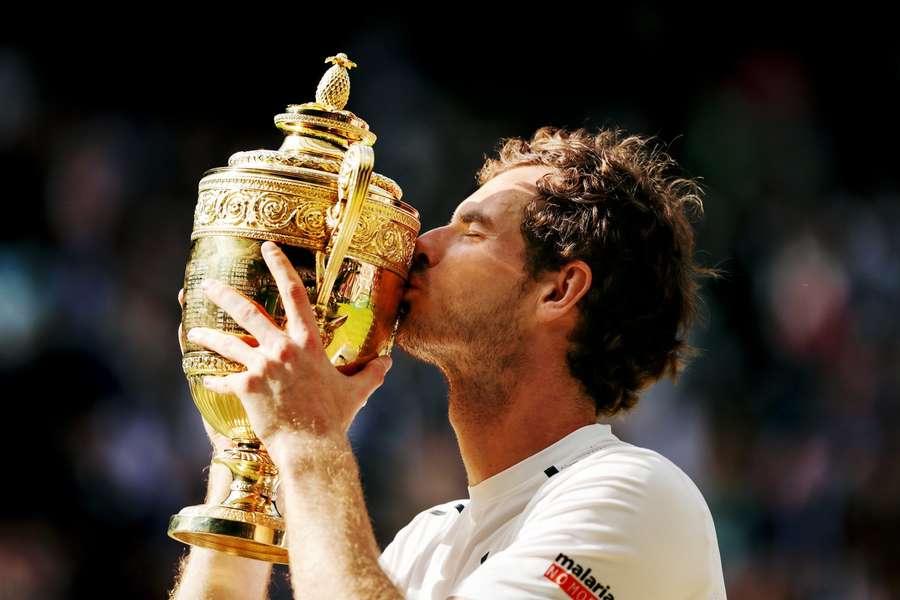Murray set to retire as Britain's straight-talking tennis trailblazer

Murray confirmed his retirement on Tuesday after a career which saw him climb to number one in the world, clinch three Grand Slam titles, two Olympic golds and amass a personal fortune of $65 million from his on-court career alone.
He accumulated 46 titles but his defining moment arrived in July 2013 when he became the first British man in 77 years to win Wimbledon.
A straight sets victory on Centre Court over childhood rival Djokovic finally laid to rest the ghost of Fred Perry, the last British man to triumph at the All England Club back in 1936.
"Winning Wimbledon is the pinnacle of tennis," said Murray as his mother Judy and girlfriend, and soon to be wife, Kim wept courtside.
"It was unbelievably stressful and then at the end of it, huge relief."
It had been a tense, knife-edge afternoon, none more so than in the deciding game as Murray saw three championship points come and go.
However, when Djokovic meekly dumped a return into the net, the celebrations began and the bitter taste of defeat to Federer in the 2012 final was forgotten.
"I was happy for Andy because he deserved it. He was working so hard to get his hands on the Wimbledon title," said Djokovic, himself a seven-time Wimbledon champion.
Murray, who reached 11 Grand Slam finals, would go on to claim a second Wimbledon title in 2016 although an eventual, lengthy battle with a hip injury meant he was never to get past the last-eight in recent years.
An ankle injury set him back in 2024 before an operation to remove a cyst on his back ruled him out of playing singles for the last time at Wimbledon.
On Tuesday, he confirmed the Paris Olympics would be his last tournament.
School massacre
The straight-talking Murray was born in Glasgow in 1987 and raised in nearby Dunblane.
The small, tightly-knit town made global headlines in March 1996.
A gunman ran amok in the local primary school where Murray, then just eight, and his older brother Jamie, were pupils.
Sixteen of Murray's schoolmates as well as a teacher died in the bloodshed.
Thomas Hamilton, who was known to the Murray family and had even previously shared a car with the brothers, then turned the gun on himself.
"Obviously, I had the thing that happened at Dunblane when I was around nine. I am sure for all the kids there it would be difficult for different reasons," Murray told a documentary in 2019.
"The fact we knew the guy, we went to his kids club, he had been in our car, we had driven and dropped him off at train stations and things."
Barcelona move
Murray first picked up a tennis racquet when he was three.
At 15, he moved to Barcelona to train rather than enter the traditionally cash-rich but often stifling environment of the established British coaching system.
The first of his 46 titles came in San Jose in 2006.
A year earlier a wiry Murray had made his Grand Slam debut as an 18-year-old at Wimbledon.
He made the third round, beaten in five sets by former runner-up David Nalbandian.
In 2008, Murray made his first Slam final at the US Open in New York, sweeping aside Stan Wawrinka and Juan Martin del Potro before seeing off top-seeded Nadal in the semi-finals. It took Federer to stop him in the final.
Murray was to lose three more major finals before securing a maiden Slam triumph at the 2012 US Open, defeating Djokovic in a memorable five-set final.
He was Britain's first men's champion at the majors in 76 years.
Earlier that summer, Murray had won Olympic gold in London. He defended the title in Rio four years later.
He also featured in another history-making moment in 2015, leading Britain to a first Davis Cup triumph in 79 years.
In 2016, he became world number one and was knighted three years later.
Murray was a widely respected ambassador for the sport and innovator, taking the relatively unusual step of hiring a female coach.
Former two-time major winner and world number one Amelie Mauresmo worked with Murray for two years.
"It's one of my regrets that I didn't win a Grand Slam when I was working with her - for a lot of people that was considered a failure," said Murray, a vocal supporter of the women's game.
'Harshly judged'
"I feel that she was harshly judged by a lot of people, purely because she was a woman."
In 2022, Murray received plaudits for donating all of his season's prize money - around $630,000 - to humanitarian relief in war-torn Ukraine.
His battle back from the brink of retirement and hip resurfacing surgery in 2019 and return to the top 50 also stunned observers.
However, a first-round loss at January's Australian Open forced him to admit that the clock was ticking.
"I want to play forever, I love the sport and it's given me so much. It's taught me loads of lessons over the years I can use for the rest of my life. I don't want to stop so it is hard," he said at his farewell Wimbledon appearance last month.

